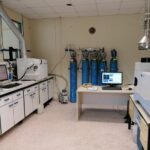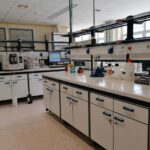Process and Product Quality Control Laboratory
Director
Laboratory Personnel
The Horizontal Laboratory of Process and Product Quality Control (HLPPQC) is based in the School of Chemical Engineering of the National Technical University of Athens (NTUA). It was established on 16/05/2003 as a Horizontal Laboratory and officially institutionalized on 02/03/2018 (Government Gazette 699B/02.03.2018) under its current title. The Laboratory serves the research and educational needs of the entire School, in the qualitative and quantitative analysis of samples and in the characterization of materials.
It collaborates with all NTUA Schools, as well as with national and international institutes, academic institutions, research centers, and scientific or social organizations, providing high-level scientific services.
HLPPQC is equipped to perform testing and measurements using state-of-the-art, high-value instruments at its facilities in the NTUA Zografou Campus. The research team consists of Chemical Engineers, Chemists, and Mechanical Engineers. The staff has extensive experience in quality control testing and measurement. Postdoctoral researchers, PhD candidates, postgraduate and undergraduate students are also actively involved through thesis work, research projects, and undergraduate courses. The Laboratory has a strong research output, with publications in international scientific journals and presentations at national and international conferences.
The Horizontal Laboratory of Process and Product Quality Control is active in the following scientific fields:
- Material characterization: study of morphology and composition of solid sample microstructures; investigation of corrosion phenomena on metal or alloy surfaces, degradation and failure of materials; imaging of different surface phases of solids; semi-quantitative elemental analysis of points and surfaces; study of the crystalline structure of solid samples; detection and identification of crystalline phases.
- Environmental studies: determination of trace and ultra-trace elements in water and waste samples; characterization of suspended particles; quantification of heavy and toxic metals in PM10 and PM2.5 filters.
- Quality control: purity testing of organic reaction products; identification of organic compounds; determination of polycyclic aromatic hydrocarbons (PAHs); analysis of essential oils, fatty acids, and surfactant compositions.


